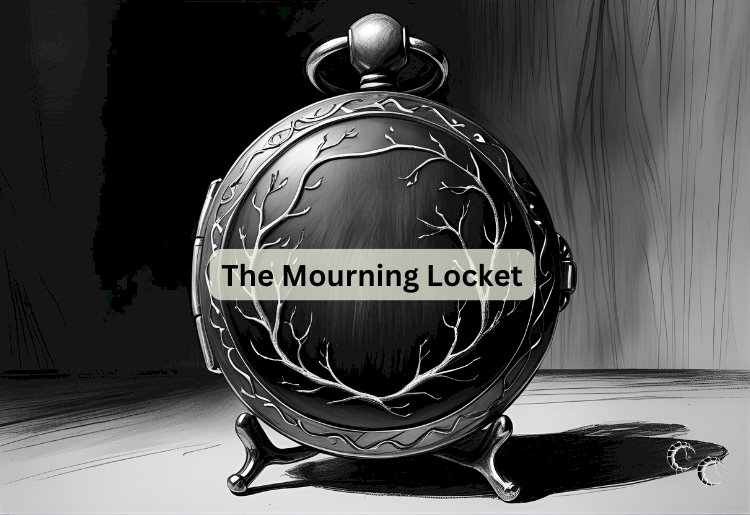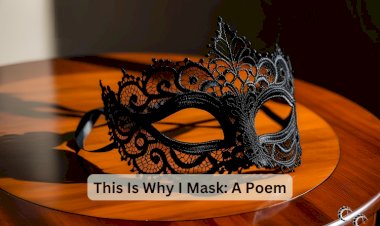The Mourning Locket

The locket arrived without warning, lying on the windowsill as though it had always belonged there. Silver, cool and impossibly smooth, its surface was etched with ivy that twisted across the metal like veins of memory. Eliza could not recall placing it, yet the moment her fingers brushed it, she felt an uncanny warmth beneath the cold. When she opened it, she did not find a portrait or a curl of hair, but a voice. Her mother’s voice, as soft as dust and as haunting as a wind through empty halls.
“You may ask,” it whispered, “but each answer will take from you what you cannot return.”
Eliza pressed it to her chest, her pulse wild and trembling. She had longed for this moment for years, for any trace of the love that had been snatched from her by the grave. Her first question spilled from her lips before she could think. Do you still love me?
“Yes,” it said. The single word sank into her bones like fire and ice, both comforting and scalding. She closed the locket, clutching it as if it could shield her from the ache that suddenly filled her. Already she felt a strange emptiness where hope had once lived.
The nights became her refuge. She opened the locket again and again, asking the questions she had kept locked in her chest. Why did you leave? Were you afraid of me? What is waiting for you beyond this world? Each reply was a shiver of sorrow, a caress of regret that left her paler, thinner, her reflection more shadow than flesh. Mirrors began to mock her. Her own eyes seemed distant, luminous with a grief she could not name.
Her neighbors whispered behind lace curtains. They spoke of the girl who walked like smoke, of the scent of wilted roses that clung to her as if death followed her steps. Children crossed the street when she passed, sensing the quiet chill that trailed her. Even the cats would hiss and flee when she lingered in moonlight.
And yet she could not stop. Each secret revealed was balm and poison. She learned what it is to be forgotten by the living, what it is to linger where memory is the only tether, what it is to carry regrets that stretch beyond the grave. Each revelation hollowed her more. Her laughter, once rare, was gone entirely. Her voice was soft and distant, as though spoken through the veil of another world.
One evening she lingered in the garden, the moon pooling silver across her mourning gown. Her hands trembled as she opened the locket once more. Will I ever see you again? she whispered, her voice breaking.
The reply coiled around her heart like fog. “When the soil closes above you, yes.”
The words echoed in her ears long after she closed the locket. Her body still walked among the living, but her soul had begun to drift, leaving a hollow shell behind. She wandered streets and graveyards alike, her gown trailing like smoke, her gloves hiding fingers that were pale and brittle. She smiled faintly, and yet no warmth reached her eyes. Those who saw her swore she had bargained with grief and been swallowed by it.
Time lost meaning. Days and nights blended into a continuous twilight. The locket became both sanctuary and torment. It pulsed against her chest like a heart that was not her own, and each beat reminded her of what she had sacrificed. Her questions grew bolder, her need for her mother’s voice insatiable, and yet with every answer she felt herself receding further from life.
Sometimes she imagined she could see her mother standing at the edge of the locket, a faint silhouette shimmering in silver. Sometimes she thought she heard other voices whispering through the ivy, secrets not meant for her ears. Each time she listened, she felt herself fracture, a delicate being splintering beneath the weight of forbidden knowledge.
She began to wander the old streets at midnight, seeking the hush of shadows where no one would see her, where the living would not notice the girl slowly turning to specter. She carried the locket always, its chain cold and heavy against her throat, a tether to something that was no longer fully hers.
And yet she loved it. She loved the answers. She loved the whispers that stitched her heart to the past even as they hollowed her present. She loved the sorrow that made her feel more alive than any living warmth ever could.
No one knew the truth, that she had traded herself for love that could never remain in the living world. No one knew that she had crossed the threshold between solace and damnation, that she now lingered in the thin, silver-lit place between life and death. And when the locket glimmers upon her throat, winding with ivy and memory, it is said that if you listen closely, you can hear a voice whispering through the shadows. Not hers. Never hers.






























